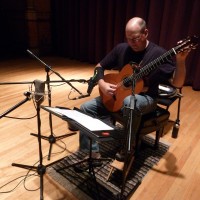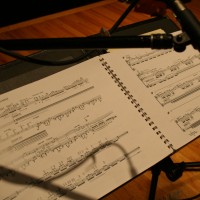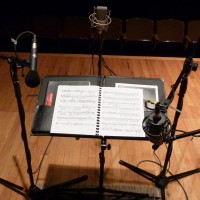Roses Don’t Need Perfume takes its title from a quotation by Uruguayan writer/philosopher (…journalist, historian…), Eduardo Galeano. In a recent interview, Galeano reflected on his own work and how, in a world of spin and manipulated language, one recognize truth.
In the first case, Roses… treats the notion of truth literally as the guitar is almost never “touched”/manipulated by the player, it sounds “as it is”. Nearly every note is a natural harmonic and the entire electronic part (minus the use of spoken text) is derived from the instrument itself. In the opening phrase, the guitarist slowly releases two fretted/stopped B naturals, allowing the natural harmonics directly beneath them (also B naturals) to sound. The whole gesture, therefore, is that of simply lifting the hand to allow the guitar to speak for the remainder of the piece.
The three movements are continuous (attacca).
I. O Viole Elastique (The Toy Guitar): This movement is a setting of a photograph of the same title by an anonymous photographer. In it a boy climbs a hill with a large bowl of laundry on top of his head. A toy guitar strung over his shoulder waits to be played. Tht title contains a word play that makes my direct translation deceptive: it refers to the instrument (a guitar/viol with elastic or plastic strings) as well as the idea of the fabric/clothing and of “violation”.
II. La Casa de las Flores (The House of Flowers): The title comes from Pablo Neruda’s poem Explico algunas cosas (“I explain a few things”), particularly its opening reference to his childhood home, destroyed during the Spanish Civil War : “My house was named /the house of the flowers, because everywhere /geraniums exploded: it was /a beautiful house / with dogs and little children. /Remember, Raul?/Eh, Rafel? /Federico, do you remember..” This text, spoken by Neruda himself, appears within in the electronic part. The final name he calls to, “Federico” is Federico García Lorca and the music here refers through Lorca to George Crumb’s Ancient Voices of Children.
III. Compana de palo (Wooden Bells): Galeano uses the phrase “compana de palo” to describe the voiceless people, those whose village tower contains only a “wooden bell”, a silouette cut to appear real but unable to make any sound. There is a secondary reference to the Argentine anarchist cultural magazine of the same title “Le Compana de Palo”, published in 1925-27, that included lively debates on art, literature, music, and social anarchy in South America.
Watch performed in Timisoara, Romainia:
A program note for Roses Don’t Need Perfume can be found below.
Guitarist Kenneth Meyer in Barnes Hall at Cornell University, recording “Roses…” in 2010
A score is also is available for download here. It is licensed under a “Creative Commons” license, see below. An electronic patch (PureData) for performance can be obtained by contacting the composer.

Roses Don’t Need Perfume for guitar and electronic sounds by Kevin Ernste is licensed under a Creative Commons Attribution-NonCommercial-ShareAlike 3.0 Unported License.







